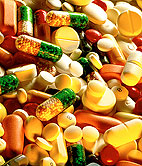
MONDAY, Nov. 14 (HealthDay News) — Heart attack patients are more likely to take needed medications if they’re free, U.S. researchers find.
Less than half of patients discharged after a heart attack take their prescribed medications, which increases hospitalizations, deaths and costs to the health care system. This study was designed to see if eliminating the co-pay fee might entice more patients to take their meds.
“We found that medication adherence went up by about 4 to 6 percent,” said lead researcher Dr. Niteesh K. Choudhry, an associate professor in Harvard Medical School’s division of pharmacoepidemiology and pharmacoeconomics.
Although the gain in adherence was modest, patients saved about $500 on average and benefited health-wise.
“This resulted in fewer major vascular events and lowered patient out-of-pocket spending for drugs and other health care services,” Choudhry said. “And it didn’t really change insurer spending.”
“Adherence is a very complex problem,” Choudhry said. “And, it’s a bit of a rarity in health care to find an intervention that improves quality and is economically neutral.”
The report was published in the Nov. 14 online edition of the New England Journal of Medicine, to coincide with its presentation at the American Heart Association annual meeting in Orlando, Fla.
For the study, Choudhry’s team used the claims processing system of the health insurer Aetna, which helped fund the study. The study included almost 6,000 patients who were treated and discharged from the hospital after a heart attack.
The researchers randomly assigned about half the patients to get their prescriptions for free and the remaining patients to continue with their usual co-pay.
The medications were those usually prescribed after a heart attack, including cholesterol and blood pressure-lowering drugs.
Choudhry’s group tracked medication adherence and the number of major cardiovascular events, including readmission for fatal or nonfatal heart attack, unstable angina, heart failure or stroke and procedures to open a blocked artery (revascularization).
They also looked at the patients’ out-of-pocket costs plus their overall health care expenses.
Overall, the patients’ adherence rate ranged from 36 percent to 49 percent in the usual coverage group. Eliminating co-pays improved adherence, but did not reduce the number of cardiovascular events or revascularization procedures, the researchers found.
However, when they took into account all events, not only first events, rates were cut by 11 percent in the patients with no co-pays.
And when revascularizations were discounted, rates of events dropped 14 percent.
Moreover, the rates of rehospitalization for another heart attack, angina, heart failure and stroke also went down, they said.
Total health care spending was not increased, and patients saw a relative reduction in out-of-pocket costs of 26 percent, the researchers noted.
The reasons why patients don’t take their drugs vary, Choudhry said. These include cost, side effects, the burden of taking a lot of pills, forgetfulness and knowledge about the drugs, he said.
“Ultimately, we need to tackle each of these,” said Choudhry.
Patients with chronic disease who do not take their medications cost the heath care system hundreds of billions of dollars each year, Choudhry said. “Non-adherence is a public health problem,” he added.
Dr. Gregg C. Fonarow, a professor of cardiology at the University of California, Los Angeles, and a spokesman for the American Heart Association, said that after discharge many patients fail to fill their prescriptions or discontinue taking needed drugs, and the consequences can be fatal.
“This simple strategy of enhancing prescription coverage, particularly if coupled with other efforts to improve patient medication adherence, may enhance the quality of care and clinical outcomes for patients after [heart attack],” Fonarow said.
Another expert, Dr. Judith Hochman, director of the Cardiovascular Clinical Research Center at New York University Langone Medical Center in New York City, said the study results are noteworthy. “What is impressive is that a small increase in the rates of adherence resulted in reduced events,” she said. “Can you imagine if we increased adherence even more?”
Other ways to improve adherence might include having pills contain more than one drug, patient education and electronic reminders, she said.
More information
For more information on heart attack, visit the U.S. National Heart, Lung, and Blood Institute.

